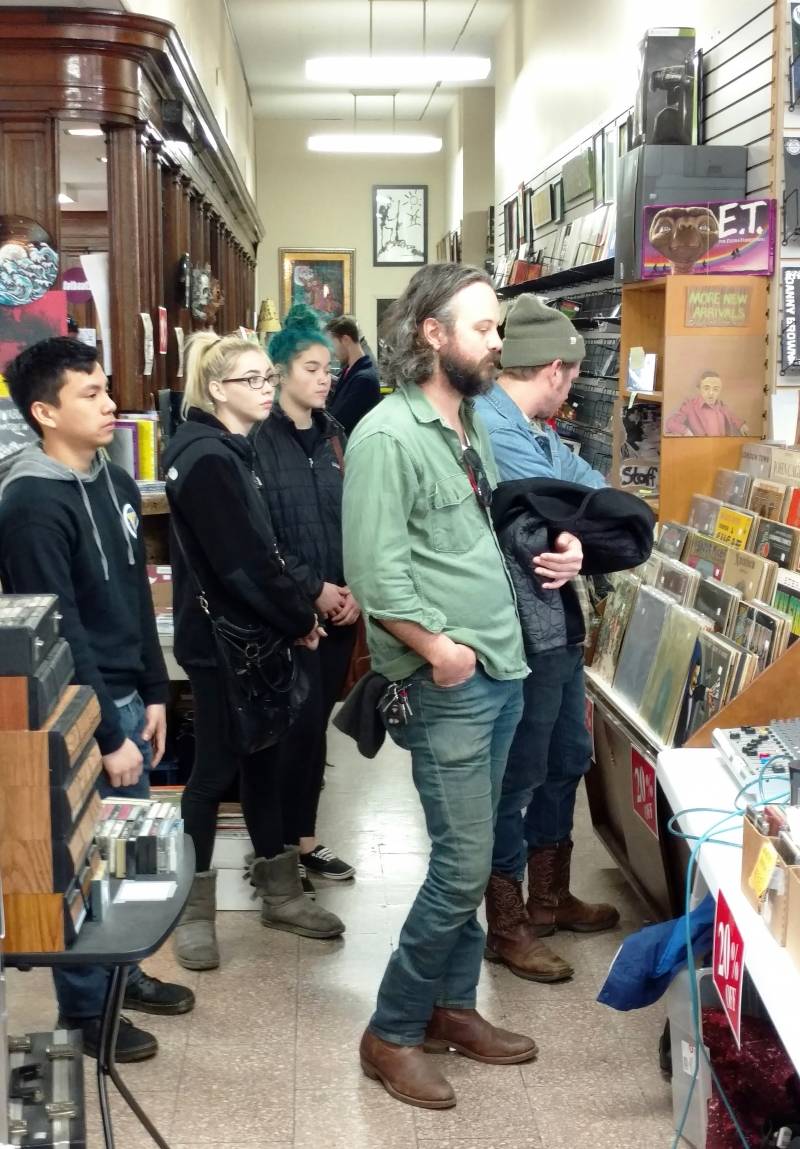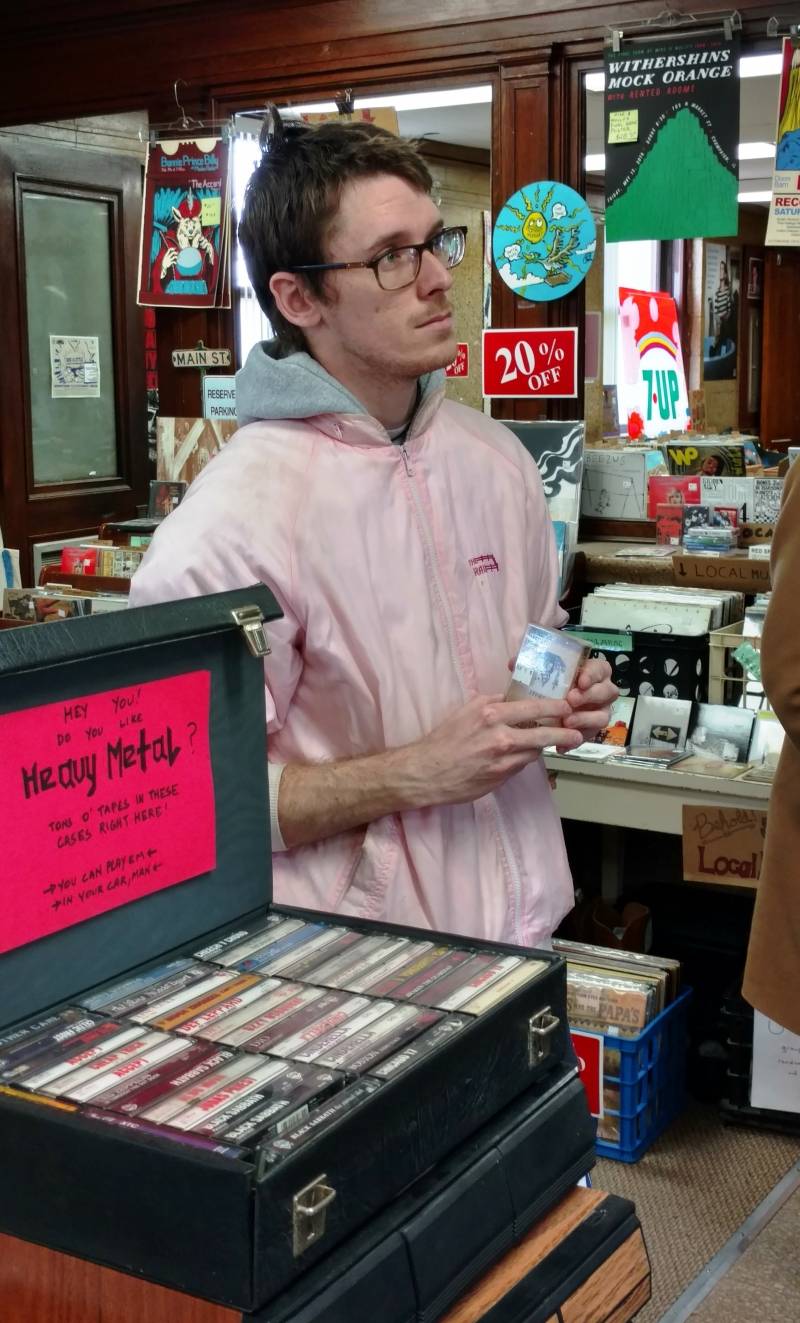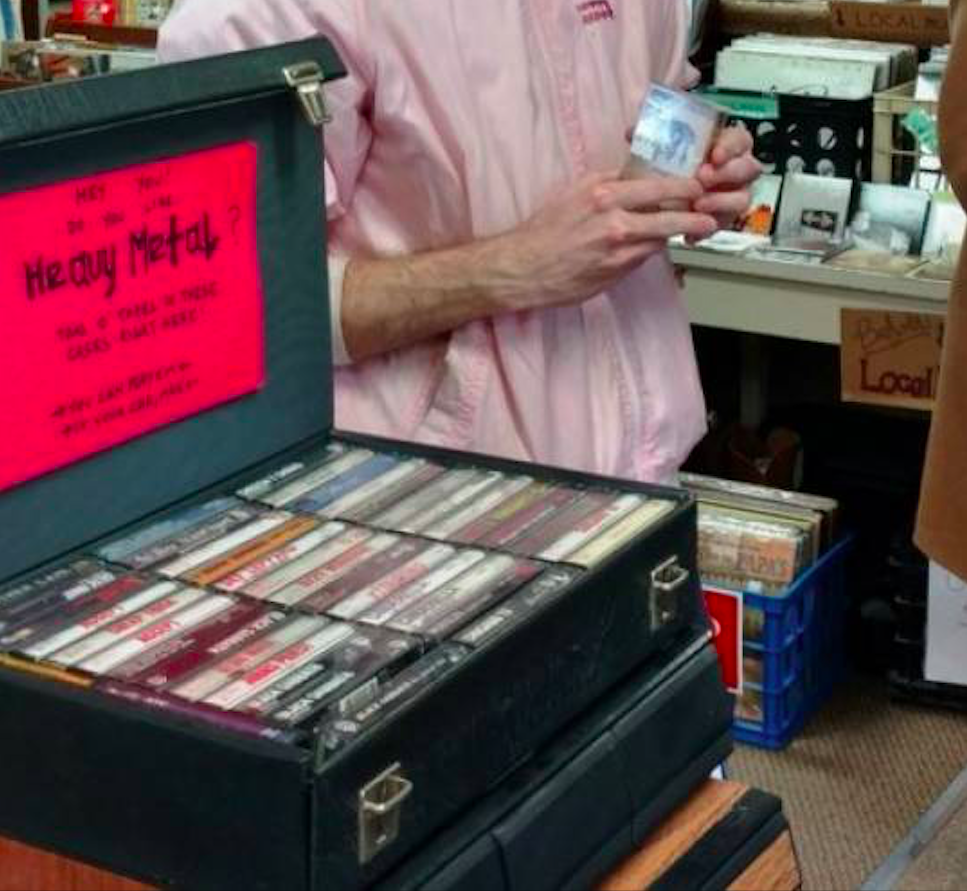The inside of Exile on Main St. in Champaign is filled with warmth on a chilly Saturday afternoon in February, thanks to acoustic guitars and heartfelt poetry readings permeating the store. With WEFT 90.1 FM on hand to record the sounds, Exile is hosting the cancer fundraising event “Give a Little: A Benefit for Imerman Angels.” A decent-sized crowd has turned out to watch local singer-songwriters perform laid-back Americana music at its finest.
Surrounding the black, record-shaped stage where musicians play and poets read is used, varied merchandise that has kept loyal customers coming back to Exile since it opened in 2004. The lived-in looking store has a wealth of products that range from vinyl albums and video games to soy candles and used shoes. Add-on candy bars sit near the register for good measure.
And Exile has “infinitely more tapes” — also known as cassettes — than it used to, according to store owner Jeff Brandt.
“When we first opened 12 years ago, we didn’t have any tapes,” Brandt says behind the counter, as customers mill about his store between acts. “Nobody came in asking for them. But over the last six or so years, we’ve been asked about them more frequently. I used to only take them as donations because we’d sell them so infrequently, but now, things that I used to price at 99 cents people will pay more for. They’ve increased in value, depending on what it is.”

Brandt’s observations about cassettes are on par with what’s happening nationally. According to a Billboard article, tapes are surging in popularity. In 2016 the music-buying public purchased 129,000 cassettes. That may not sound like a huge figure — as a comparison, 13 million vinyl units sold in 2016 — but cassette sales last year increased by a whopping 74 percent.
Why the upped interest in tapes? Brandt feels people enjoy the process of collecting cassettes, which, being a unique music format these days, offer a collection appeal similar to vinyl. He says tapes also have a do-it-yourself feel nowadays as bands release them and include a code to download the album digitally.
A big supporter of local music, 26-year-old Champaign resident Brian Dunn digs the onstage acts playing at Exile. Standing next to his girlfriend, Melissa, he wears a light pink jacket that has seen better days and blue sweatpants. During the performances he nods his head in time with the music. Between acts the cassette enthusiast scans the store’s tapes in search of a gem or two, discovering three: Jubilee by Hot Cops!, 4 Songs by Nectar, and Swass by Sir Mix-A-Lot.
The nearly six-foot-two Dunn is particularly stoked about the Sir Mix-A-Lot album because hip-hop cassettes aren’t as prevalent in Exile, where he shops every two weeks. He’s the assistant manager at WEFT and hosts the show Cassette Cacophony every Sunday Monday morning from midnight to 2 a.m. As people drive around in their cars these days listening to SiriusXM satellite radio, Dunn plays tunes on WEFT directly from tapes.
Possessing an easy smile and cheerful demeanor, the tousle-haired Dunn admits he’s not the music aficionado that folks might think he is. But he loves attending local concerts, where for several years he has purchased tapes released by C-U acts.
“I just started growing this collection, and the point of it was to support these local bands,” Dunn says.

He takes pride in playing a wide variety of music on Cassette Cacophony, but admits cassettes shouldn’t be romanticized too heavily. Dunn says they wear out, the tape inside can get loose, and it’s more difficult to cue up songs from cassettes on his WEFT show.
On the flip side, Dunn says cassettes are durable, and if they do get ruined it’s not a big deal: He can purchase more at economical prices. He also likes another factor about tapes.
“It kind of forces you to listen to music in a different way. You don’t get that instant gratification. You really listen to albums as a whole, from front to back,” Dunn says.
Onstage, soulful singer Cole Rabenort of the band The Fights plays a short acoustic set, belting out poignant lyrics that invoke a sound and vibe similar to country singer Chris Stapleton. After one of his songs he tells the audience about a relative of his whom he never met but who lives on through a treasured picture Rabenort owns and via life stories passed on. The musician calls such human continuation “transcendental.”
Tapes have somehow also lived on in an age of Spotify and iTunes, which feels almost as mystical as Rabenort’s musings. The used tapes in Brandt’s store — from Louis Armstrong to Metallica to Jewel — were once loved by devotees of countless big-named acts. That devotion manages to endure.
“I kind of like it when things have more character,” Dunn says. “This Sir Mix-A-Lot cassette, it’s a little grody, it’s a little dusty, probably gonna have some pops and stuff in it. And I like that. That’s cool to me.”








